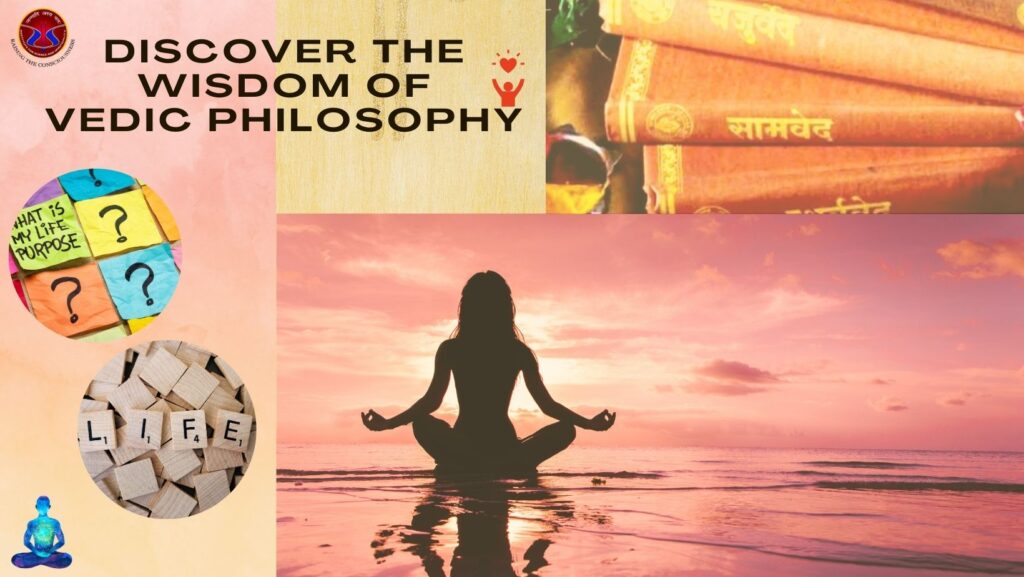Table of Contents:
- Introduction
- The Vedas: Timeless Wisdom
- Core Principles and Purusarthas
- Understanding the Universe: Sambandha, Abhidheya, Prayojana
- Expanding Vedic Wisdom: Texts and Practices
- The Six Darshanas and Vedic Rituals
- Contemporary Relevance and Challenges
- Conclusion
Introduction
Vedic Philosophy, an ancient system of understanding that originated in India, delves deep into the essence of existence, the cosmos, and the human psyche. Emerging from the Vedas, this rich tradition surpasses mere religious dogma; instead, it embodies a holistic perspective that contemplates the core elements of life and awareness. The wisdom within Vedic teachings is encapsulated by a verse from the Isha Upanishad that speaks of completeness and endless possibilities: “पूर्णमदः पूर्णमिदं पूर्णात्पूर्णमुदच्यते | पूर्णस्य पूर्णमादाय पूर्णमेवावशिष्यते ||”. This verse highlights the concept of wholeness and infinite potential as fundamental principles in Vedic philosophy.
The Vedas: Timeless Wisdom
The timeless and profound Vedas serve as the cornerstone of Vedic Philosophy, transcending mere historical accounts. While scholars have debated the specific timeframes within which these sacred texts were composed, with estimates ranging from 1500 to 500 BCE, it is imperative to acknowledge that their origin lies even further back in the oral tradition, dating back to the dawn of Kaliyuga. This oral lineage emphasizes the profound depth and antiquity of Vedic wisdom, extending beyond conventional historical constraints. Within the Vedas lie the Rigveda, Samaveda, Yajurveda, and Atharvaveda – each offering a distinctive perspective towards fostering a comprehensive comprehension of existence and the universe. While Rigveda is the collection of ancient Indian Hymns, focusing on cosmology and deity worship. The Samaveda is a compilation of chants and melodies used in rituals from the Rigveda. The Yajurveda contains prose mantras for vedic rituals and sacrificial procedures. The Atharvaveda includes hymns, spells and incantations for everyday life related to health, longetivity and practical wisdom. Dismissing outdated notions like the Aryan Invasion Theory, it becomes evident that the Vedic civilization was not nomadic but rather cultivated and settled; a civilization rich in culture and spirituality.
Harmonizing the Sanatan and Western timelines involves more than an academic exercise; it reveals the intricate interactions between empirical research and spiritual belief. While the Western viewpoint stresses empirical proof and historical background, the Sanatan outlook emphasizes the sacred, timeless essence of Vedas, transcending historical boundaries. This discussion encompasses broader talks on the nature of sacred knowledge, the beginnings of human civilization, and enduring importance of the Vedas as both a spiritual compass and a cornerstone of cultural heritage. Regardless of the specific time, the profound influence of the Vedas on spiritual rituals, philosophical explorations, and cultural customs remains undeniable, showcasing their external significance and widespread appeal.
Core Principles and Purusarthas
The core of Vedic Philosophy encapsulates the fundamental concepts of ethical duty (Dharma), prosperity (Artha), pleasure (Kama), and liberation (Moksha). These principles serve as guiding lights for individuals, steering them on a path that stresses the importance of harmoniously seeking both material and spiritual objectives in life. Furthermore, adherents of Vaishnavism bring forth a fifth purusartha, Prema, which underscores unconditional divine love as the paramount aspiration. This intricate comprehension of life’s pursuits enhances the Vedic viewpoint on human existence by offering a profound framework for personal growth and fulfillment.
Understanding the Universe: Sambandha, Abhidheya, Prayojana
Vedic Philosophy provides a structured lens through which individuals can gain a deeper understanding of their connection within the cosmos. This philosophical system delves into the intricate relationships between God, soul, time, karma, and nature, encapsulated within the concept of Sambandha. It also elucidates on Abhidheya, highlighting the significance of spiritual practices in one’s journey towards enlightenment. Furthermore, Vedic Philosophy sheds light on Prayojana, guiding seekers towards the ultimate goal of achieving divine love. By emphasizing the interwoven nature of all existence, this framework offers a holistic approach to spirituality that encourages individuals to recognize their place in the grand tapestry of creation.
Expanding Vedic Wisdom: Texts and Practices
Various texts, such as the Upanishads, Vedangas, Upavedas, Itihasas, and Tantras, serve as extensions of the Vedas. These influential writings further elaborate on Vedic principles by delving into topics like creation, morals, and the quest for wisdom. The Upanishads stand out for their profound exploration of reality, identity, and spirituality. The realm of Vedic knowledge is vast and not limited to spiritual matters; it also encompasses areas like science, engineering, and building design. This demonstrates the comprehensive nature and relevance of Vedic teachings in various aspects of life.
The Six Darshanas and Vedic Rituals
The depth of Vedic Philosophy is enhanced by the Six Darshanas(Six Schools) – Nyaya (reasoning), Vaisheshika (atomic theory), Samkhya (enumeration), Yoga (path to enlightenment), Mimamsa (ritual interpretation), and Vedanta (the culmination of the Vedas), which are distinct philosophical schools presenting diverse perspectives on comprehending the universe and our interconnectedness with it. Through profound contemplation and reflection within these Darshanas, concepts like yoga and meditation are born, serving as pathways for individuals to embark on a journey towards not only inner tranquility but also alignment with the universal order. These ancient teachings offer invaluable wisdom that helps individuals navigate the complexities of existence, fostering a sense of serenity and unity with the cosmic rhythms that govern the world around us.
Contemporary Relevance and Challenges
In the current fast-paced and often fragmented society, Vedic Philosophy serves as an enduring source of wisdom, providing profound insights on how to live a life characterized by unity, ethical conduct and profound purpose. This ancient body of knowledge, rooted in India’s spiritual and philosophical traditions, continues to motivate and direct individuals aiming to navigate the intricacies of the contemporary life. Incorporating Vedic Philosophy into present-day living encounters notable obstacles. The consistent connectivity and digital engagement obstruct the necessary solitude for meditation and reflection, which are crucial in Vedic traditions. Furthermore, the diverse nature of modern society may breed doubt towards age-old knowledge, while the language barrier and demand for genuine interpretation make understanding and utilization more challenging. Nonetheless, the principles of Vedic Philosophy provide enduring wisdom, urging novel strategies to adjust its teachings to tackle contemporary global problems and foster a fairer, enlightened global society. Despite the difficulties encountered in deciphering and utilizing its intricate and occasionally abstract lessons, the fundamental tenets of Vedic Philosophy: interconnecatedness, unity, pursuit of happiness & enlightenment – retain their significance and influence today just as they did millennia ago. The persistent dedication, to acquiring knowledge and reaching a state of profound understanding is perhaps the most ambitious element of Vedic philosophy. It urges individuals to partake in an ongoing process of education. self-discovery and spiritual development. This pursuit goes beyond mere academic endeavors, requiring profound introspection and the fostering of qualities like modesty, endurance and persistence. By adopting these values, we can cultivate a kinder, more equitable and enlightened way of living that benefits the Earth and all its dwellers. Consequently, Vedic Philosophy not only survives in contemporary times but prospers by presenting ageless insights for an improved global community.
Conclusion
Lastly, let’s reflect on this ancient verse from the Yajurveda, “ॐ द्यौः शान्तिरन्तरिक्षं शान्तिः पृथिवी शान्तिरापः शान्तिरोषधयः शान्तिः। वनस्पतयः शान्तिर्विश्वेदेवाः शान्तिर्ब्रह्म शान्तिः सर्वं शान्तिः शान्तिरेव शान्तिः सा मा शान्तिरेधि॥ ॐ शान्तिः शान्तिः शान्तिः॥” It’s a powerful prayer that calls for peace in all aspects of life. This beautiful aspiration of Vedic Philosophy aims for a world where harmony reigns not only among humans but also in the spiritual realms. As we explore this ancient wisdom, let it illuminate our paths, fostering a world imbued with tranquility, insight, and spiritual fulfilment. Through Vedic Philosophy, we gain not only a historical understanding but also a living tradition that nurtures our journey towards a harmonious and purposeful existence.


